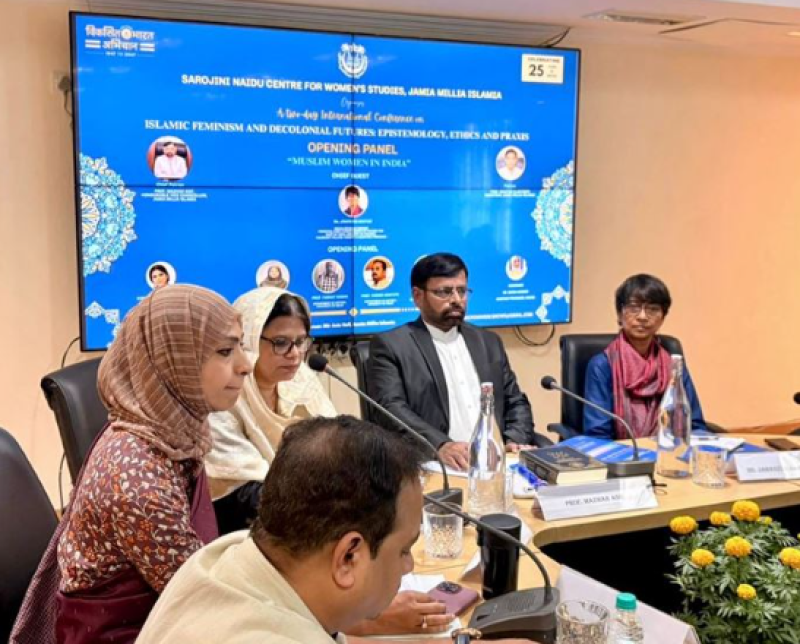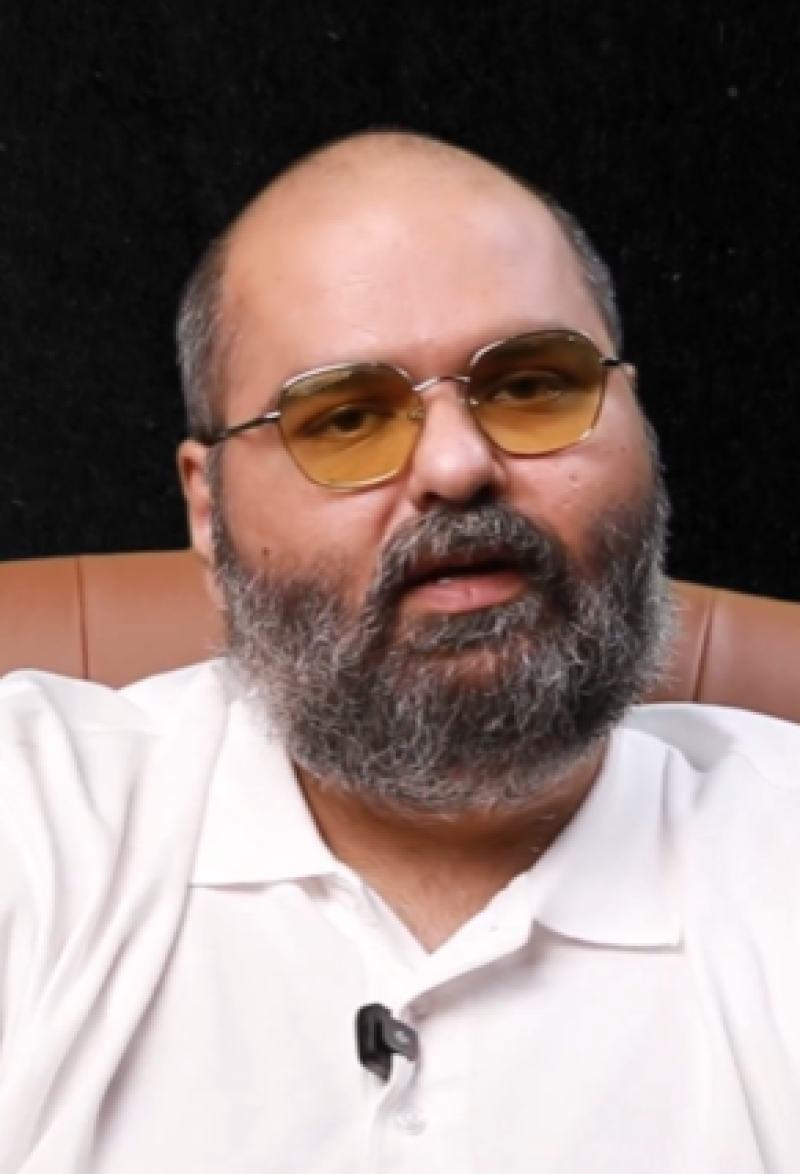The Sarojini Naidu Centre for Women's Studies (SNCWS) at Jamia Millia Islamia organised a prestigious two-day International Conference on 7th–8th November 2025 at Mir Anis Hall and SNCWS. The conference was organised as part of the celebrations marking 25 years of the establishment of the SNCWS, bringing together distinguished international scholars, researchers, and academicians to engage with critical questions at the intersection of Islamic feminism, decolonial thought, and contemporary gender discourse.
The conference commenced with the recitation from the Holy Quran by Dr. Mohd Sayeed Anwar.
The Hon'ble Vice Chancellor and Chief Patron, Prof. Mazhar Asif inaugurated the conference and felicitated the Chief Guest Ms. Jahanzeb Akhtar, Indian Revenue Service, Principal Chief Commissioner of Income Tax, Government of India, Ministry of Finance, and Fulbright Fellow of the Hubert H Humphrey Program, with a memento and a sapling. The Chief Guest, Ms. Jahanzeb Akhtar, Principal Chief Commissioner of Income Tax, Government of India, and a Fulbright Fellow, offered an incisive and grounded reflection on the praxis of Islamic feminism. She drew upon her experiences in administration and public life and highlighted how feminist ethics rooted in faith must translate into social justice, policy engagement, and everyday practice. Her address underscored that scholarship gains meaning when it informs praxis , the lived enactment of justice and equity in the world
Prof. Nishat Zaidi, Honorary Director, SNCWS and the Conference Chairperson , formally welcomed all the dignitaries, delegates, and participants. Her thoughtful observations traced the SNCWS's 25-year journey of academic excellence, highlighting the centre's sustained commitment to research, academics, and outreach activities in the field of women's studies. Dr. Amina Hussain, Convenor and Assistant Professor at SNCWS, provided a comprehensive and nuanced introduction to the conference theme, emphasising the significance of Islamic feminism as both a scholarly framework and a decolonial praxis. She elaborated on the epistemological, ethical, and practical dimensions of Islamic feminism, situating it within broader decolonial thought and contemporary gender justice movements. The Inaugural Session was followed by the Opening Panel on "Muslim Women in India," chaired by Prof. Nishat Zaidi with Dr. Firdous Azmat Siddiqui as Discussant and Dr. Amina Hussain as Moderator. The panel featured distinguished presentations by Prof. Azra Abidi, Department of Sociology, Jamia Millia Islamia, on "Faith, Gender, and Power: Rethinking Muslim Women's Political Presence in South Asia"; Dr. PK Yasser Arafath, Department of History, Delhi University, on "Wailing the Veil, and Veiling the Wail: Gendered Spaces, Sartorial Imaginations, and 'Malayala Islam' in Colonial Malabar; and Dr. Hem Borker, Department of Social Work, Jamia Millia Islamia, on "Rethinking Gender and Agency: Educational Journeys of Muslim Girls in a Madrasa".
The comprehensive two-day conference featured extensive and meaningful academic engagement across multiple technical sessions. Over 70 research papers were presented in parallel technical sessions on 7th and 8th November, representing diverse geographical contexts, methodological approaches, and thematic concerns. Some of the papers included “Reclaiming Voice and Agency: Feminist Interventions and Islamic Epistemologies in West Asia” by Dr. Sana Aziz (Assistant Professor, Aligarh Muslim University); “The Cosmology of the Salon: Hair, Veiling, and Sufi-Feminist Ethics in Pasha’s Girls” by Dr. Amany Alsiefy (Humboldt University, Germany); “Reclaiming the Sacred: Faith-Based Feminism and Legal Reform in Shiʿi Iran” by Dr. Samaneh Oladi (Virginia Commonwealth University); and “Bodies in Resistance: Muslim Women Activism and the Politics of Visibility” by Nilofar Anjum Siddiqui (Research Scholar, Jawaharlal Nehru University).
The conference explored diverse themes including Feminist Epistemologies and the Politics of Knowledge Production in Islam; Decolonising the Gaze: Feminist Politics of Visibility and Voice in Islam; Sufi Imaginaries and Feminist Spiritualities; Revisiting Islamic Jurisprudence: Gender Justice and Family Law Reform; Lived Experiences of Muslim Women and Grassroots Activism; Historical Trajectories of Muslim Women's Scholarship and Activism; Muslim Women and Fiction: Islamic Feminist Perspectives; Intersections of Islamic Feminism with Decolonial Thought; and Digital and Cultural Frontiers of Muslim Feminism.
The conference featured three distinguished keynote and plenary addresses. Prof. miriam cooke delivered a keynote address on "Islamic Feminism Across Time and Space" on first day of the conference.
On the second day ,Dr. Roja Fazaeli presented a plenary lecture on "Defining 'Muslim Woman': Notes from the Field on Iranian Women's Identities in the Diaspora," and Professor Asma Afsaruddin delivered a plenary address on "Rereading the Qur'an through a Muslim Feminist Lens."
The technical sessions engaged academicians, researchers, and scholars from diverse institutions including Jamia Millia Islamia, Jawaharlal Nehru University, Delhi University, Aligarh Muslim University, Darul Huda Islamic University, University of Kashmir, international scholars from Humboldt University Germany, University of Pisa Italy, Virginia Commonwealth University, Harper College Illinois USA, Taibah University Saudi Arabia, and universities across India representing Kerala, West Bengal, Rajasthan, and other states.
The two-day international conference concluded with an insightful Valedictory Address by Professor Kecia Ali on "Islamic Feminism and Struggle for Justice Today." Her address offered a critical reflection on the contemporary challenges and future trajectories of Islamic feminist thought and praxis, emphasising the importance of continued scholarly engagement with questions of justice, equity, and decolonial futures.
The dignitaries lauded and acknowledged the SNCWS's visionary leadership in creating international platforms for critical dialogue on Islamic feminism and decolonial thought. The conference concluded on a note of renewed commitment to advancing gender justice through rigorous scholarship, transnational dialogue, and collaborative research. The conference underscored the university's unwavering commitment to advancing feminist scholarship and women's empowerment as integral components of its academic mission, with SNCWS playing a pivotal role in shaping contemporary gender discourse.


